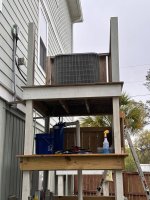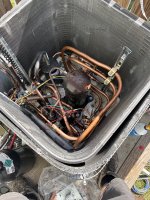Wanted to give my thoughts for anyone looking at one of these.
First, shoutout to Devon at Hotspot who answered my many questions. Im sure he is sick of me by now.
My take:
This system while it gives you free heat for the pool is incredibly complicated for a heat pump installation. You basically have to incorporate a second reversing valve into an already pretty busy condenser system. I have a 4 ton HVAC unit which moves 48K BTU plus whatever losses. lets call it 50K BTU to be easy. I am in the south so I get plenty of run time on the AC system.
My biggest take away before purchasing this unit is ask hotspot if anyone has purchased a unit in your area and see if they know the installer who did it. I called 10 HVAC places and nobody would do the work. Everyone told me to call a pool company, or outright declined after looking at the manual. I ended up doing all of the mechanical and system wiring (24VAC and sensors) work myself because I could not find a tech or company in the area who wanted to take the time. I think I realistically spent about 4 days on and off working on plumbing, fitting, brazing, wiring, etc. They claim it's a 4 hour job, maybe if you don't have a heat pump system it's 4 hours and you are highly competent working with HVAC. I have a degree in Mechanical engineering and love working on stuff, but even with that It took a lot of time to complete. this is not considering all the YouTube university time invested to learn the trade. (side note, I will no longer be paying my HVAC company 300 dollars every 6 months to maintenance my system after I learned what they are actually responsible for).
To quote my wife "if nobody has it or will do the work, is it actually as good of an idea as it sounds"
She's a smart woman, smarter than me. Was she right? time will tell. The system is working and does indeed heat the pool. It's a trickle compared to a 400K gas unit, but it's enough to maintain heat and it doesn't cost you any additional money once operational. The system was 2300 dollars from Hotspot and I have probably another ~750 dollars in parts and materials (R410A isn't cheap), so call it about 3K all in.
If I had to give it a rating...
1 out of 10 for install difficulty
6 out of 10
Would I do it again... I don't know, probably because I'm a geek and love cool stuff while saving energy.
First, shoutout to Devon at Hotspot who answered my many questions. Im sure he is sick of me by now.
My take:
This system while it gives you free heat for the pool is incredibly complicated for a heat pump installation. You basically have to incorporate a second reversing valve into an already pretty busy condenser system. I have a 4 ton HVAC unit which moves 48K BTU plus whatever losses. lets call it 50K BTU to be easy. I am in the south so I get plenty of run time on the AC system.
My biggest take away before purchasing this unit is ask hotspot if anyone has purchased a unit in your area and see if they know the installer who did it. I called 10 HVAC places and nobody would do the work. Everyone told me to call a pool company, or outright declined after looking at the manual. I ended up doing all of the mechanical and system wiring (24VAC and sensors) work myself because I could not find a tech or company in the area who wanted to take the time. I think I realistically spent about 4 days on and off working on plumbing, fitting, brazing, wiring, etc. They claim it's a 4 hour job, maybe if you don't have a heat pump system it's 4 hours and you are highly competent working with HVAC. I have a degree in Mechanical engineering and love working on stuff, but even with that It took a lot of time to complete. this is not considering all the YouTube university time invested to learn the trade. (side note, I will no longer be paying my HVAC company 300 dollars every 6 months to maintenance my system after I learned what they are actually responsible for).
For a heat pump:
The system involves the addition of a specialized reversing valve for the liquid cooled condenser, a special dual check valve solenoid thing (for heat pump operation), control box, an additional transformer, and an additional liquid receiver to match the capacity of the air and liquid cooling condensers (for me that was an additional 15 feet of 7/8" tubing).
For a standard AC, I think it is just adding the reversing valve, transformer, and additional tubing (easy with the extra space in the condenser).
To quote my wife "if nobody has it or will do the work, is it actually as good of an idea as it sounds"
She's a smart woman, smarter than me. Was she right? time will tell. The system is working and does indeed heat the pool. It's a trickle compared to a 400K gas unit, but it's enough to maintain heat and it doesn't cost you any additional money once operational. The system was 2300 dollars from Hotspot and I have probably another ~750 dollars in parts and materials (R410A isn't cheap), so call it about 3K all in.
If I had to give it a rating...
1 out of 10 for install difficulty
This thing sucked to install on a heat pump system, plus I have a reversing valve energized to cool which borked their programming, which they are still working on fixing the bug (message me if you want to know more about that)
5 out of 10 for documentationI found some inaccuracies in their manual, overall decent but with the complexity this is not a DIY job
9 out of 10 for operationIt does what it says, it heats the pool with your AC and cools your house very efficiently. I found a workaround for the issue above, but I had to resolve it myself using my working knowledge of electrical systems (only an issue with heat pumps that power the reversing valve for cooling mode, which of course I have)
Overall Score6 out of 10
- The system is complex
- Absolutely voids your warranty on a HVAC system (convince me im wrong)
- If I sell the house gods speed to anyone who takes over because I doubt anyone will be willing to troubleshoot or maintenance this thing
- Has a fatal flaw in my system arrangement without fix applied
- Trickle heats the pool
- Makes your AC near silent because it stops the fan while in pool heating
- It's cool as heck to show people. Anyone technical will love it
- Controller interface is super simple. Set the temp you want the pool to be and it does the rest.
Would I do it again... I don't know, probably because I'm a geek and love cool stuff while saving energy.
Last edited:



